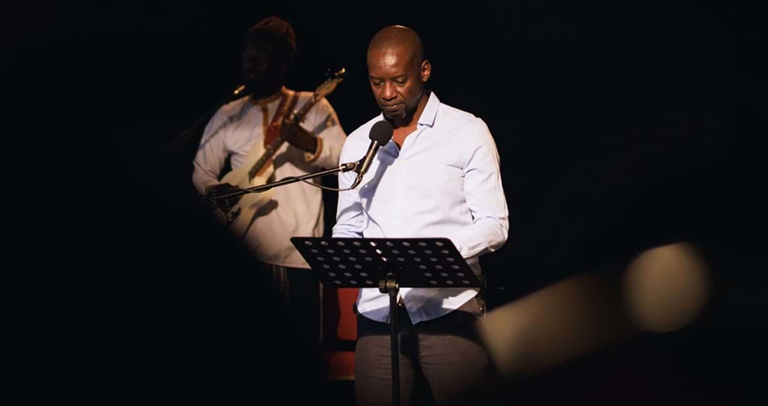A musical reading Dorcy Rugamba. Accompanied by Majnun
Thirty years after the genocide perpetrated against the Tutsi, Dorcy Rugamba, actor, author and director, brings to life an extract from his work Hewa Rwanda – Letter to the absent, a profoundly moving tale of his family, culture, and spirituality.
Thirty years after the genocide perpetrated against the Tutsi (also known as the 'Rwandan genocide'), Dorcy Rugamba, actor, author and director, brings to life an extract from his work Hewa Rwanda – Letter to the absent, a profoundly moving tale of his family, culture, and spirituality.
“How can one grasp the full dimension of an event that wiped out more than a million people, in which my brother’s death ... is almost an anecdote, one case out of a million others?”.
In tandem with Senegalese multi-instrumentalist and singer Majnun, Rugamba presents a musical reading from his new memoir - an ode to immeasurable loss and love.
Every year, Dorcy Rugamba returns to his family's home in Kigali. Ivy still climbs up the walls, calla lilies and fire tongues grow on the terrace, the palm tree and the papaya tree are still there at the entrance, as well as Mount Jali to the north and Mount Kigali to the south. His return was, however, impossible for many years.
In his book, a love letter to those who are no longer there and a hymn to life and to his ancestors, Dorcy Rugamba addresses his father, mother, and all those who are absent.
He speaks of what he saw and what he learned from them, as a child and young man, and the time it took him to accept the unacceptable. He remains as close as possible to those who are absent, honours their memory and lives, and explores the world of before in search of its beauty and poetry.
He then asks himself: how can we translate into words that which is out of our reach? Dorcy Rugamba, a major figure of the Rwandan cultural scene, brings us this moving account, transporting us with his writing and a voice of rare intensity.
"While 'Hewa Rwanda, Letter to the Absent,' addresses the genocide, questions of mourning, and a family that was nearly annihilated, I primarily wanted it not to be a commemorative text but a hymn to life, so the tone of the text deliberately embraces lightness, humour, poetry, music, and life in all its aspects.
"Over time, I realized, long after the genocide, that the victims, after losing their lives, faced another form of annihilation—the risk of their existence disappearing as well, after their bodies. Young Rwandans born afterward, as well as international audiences, no longer know who these people were. We often only know their number; sometimes their names are engraved on a stone. Their existence tends to vanish behind their status as victims. A person’s existence is much richer than his biological life. There are many things that survive death under normal circumstances: a person’s culture, their projects, their loves, their ambitions, their legacy, their ideals, their achievements, the struggles and challenges they faced during their existence and to which the world afterward is indebted. All of this, in the memory of the living, tends to fade before the enormity of the genocide.
"This 'love letter to the absent' is therefore a hymn to life, an attempt to symbolically resurrect the absent so that their lives and existence can be restored to them, and they can cease to be merely the unfortunate victims of a genocide."
Dorcy Rugamba
Author: Dorcy Rugamba
Performers: Dorcy Rugamba and Majnun
Musical creation: Majnun
Stage manager: Jules Niyonkuru
Dialogue Director: Judith Dennis
RAI Production - Rwanda Arts Initiative (Rwanda)
Producer: Ellen Dennis (USA)
Tour manager: The Charge of the Rhinoceros (Belgium)
Book published by JC Lattès (France)

